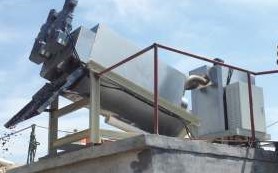Money to be rolled into wastewater treatment plant project
After years and months of frustration, the City of Austin has finally been approved to receive funds from the state for its Wastewater Treatment Plant project after the Legislature, on Monday, passed a $2.6 billion capital investment package to cap the 2023 session. Pulping Machine

Included in the bill is $14.5 million the city has been asking in previous years, but have been denied by a Legislature that hasn’t passed a bonding bill since 2020.
Austin’s cut, along with the rest of the package, will be funded through the sale of general obligation bonds and by cash.
“I’m happy the legislative process worked out to get us $14.5 million,” said Mayor Steve King Tuesday morning. “It’s been a topic of conversation daily for probably a year and a half.”
Austin had been in the running during past sessions for bonding bill money, but it had always slipped away, including last year when the bonding bill was denied at the last minute.
The City then upped the request to $20 million, but ultimately settled on the original $14.5 million.
“We’re thankful to have secured $14.5 million for this core infrastructure need,” said City Administrator Craig Clark. “Our new plant helps us meet the State imposed requirements for water quality and will significantly improve the environment.”
“This $105 million project is a significant financial burden and we thank all the legislative leaders in making this long-awaited appropriation a reality,” he added.
The entire situation has been the root of frustration for city leaders and has also had real world effects on taxpayers in Austin as administration and the City Council has been wrestling with a project that has steadily increased in scope over the years.
Currently, the plant is sitting at an estimated $105 million.
“The process along the way has been arduous and frustrating,” King said simply.
That frustration was at its highest after Austin missed out on money last year and in the gap of not having that money faced an $8 million gap in revenue.
The council voted to increase sewer fees by 15% this year, 10% next year and 7% in 2025 and 2026 to make up that difference — a direct result of missing out on bonding funds.
The Legislature’s first attempt at a bonding bill failed in March, when the Senate voted down a $1.5 billion bill after Republicans argued that it should be tied to tax cuts.
For this latest bill, GOP support came after Democrats agreed to tie bonding money to funding for nursing homes that results in $300 million in aid as facilities cope with inflation impacts as well as a staffing crisis.
According to Steven Lang, Austin city engineer, preliminary work on the plant started this spring with the bulk of work scheduled to start this summer and stretch through to 2026, making it one of two mammoth projects to take place in Austin during that time span along with the Minnesota Department of Transportation’s bridge project.
The remodel project will include updating existing buildings and tearing down and replacing other buildings. The main part of the project will be the construction of a new tank measuring 150 by 275 feet with a depth of 25 feet that is part of the plant’s conversion from a trickling filter system to a sludge treatment process.
“It is a huge structure,” Lang said. “It’s a good portion of the overall construction cost — 20% of the project cost. That’s where we are starting. We’re getting a head start on that portion of the work.”
Lang said construction at the facility will be like a dance because they are switching over systems.
“All that has to be done in stages has to keep existing processes in the building,” he said. “There is a very choreographed process and we’ve started with some of the easy stuff first.”

Small Sewage Treatment Plant — Minnesota Public Radio contributed to this story.
